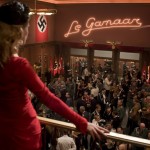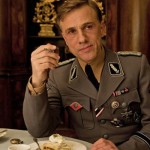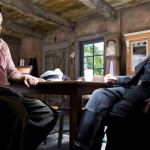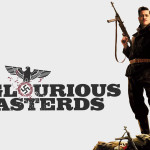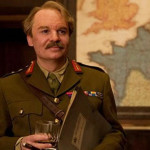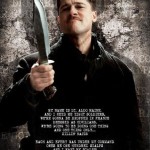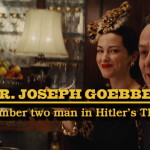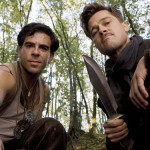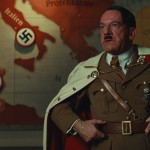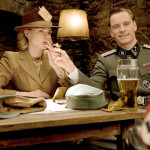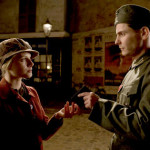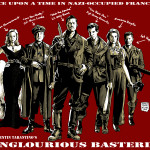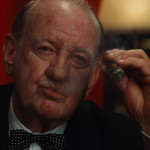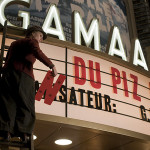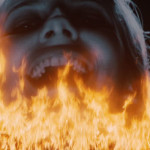I’m told that Inglourious Basterds (an in-joke of a title corrupting the 1978 Italian Inglorious Bastards) is now the hip Tarantino movie to love, and certainly appears to be my son’s favourite. My view has always been that there are unquestionably some great moments in the film, but the bad moments make it hard going over 154 minutes; there is a tight and pretty darned excellent 120 minute movie fighting to get out, over-inflation being a product of excesses of the Tarantino ego, as discussed in my review of Django Unchained. Have a few miscellaneous facts about the movie here.
Bearing in mind the director’s habit of mimicking genres and cult movies, he describes IB (not, on this occasion, “irritable bowel”) as “my Dirty Dozen or Where Eagles Dare or Guns of Navarone kind of thing.” That “bunch-of-guys-on-a-mission” thing is not difficult to spot, though the cartoonish excess follows on close behind – though this hotchpotch of a movie is many things, and ultimately a romp.
Where Kill Bill applied boundless grotesque deaths to the martial arts genre, so IB demonstrated gung ho tasteless overindulgence by taking revenge on Nazis (the eternal scapegoat baddies and stooges in every war film, 70 years after WWII ended) to a whole new level. I’ve argued before that it’s time we moved on and found a more sophisticated and subtle approach to good and bad – and it’s heartening that this sage advice has been accepted by the film industry, by and large.
Not by Quentin though; his Nazis are quietly evil and do nothing whatever to dispel the clichés and myths rewritten into the plot, preferring instead to fan the flames wherever possible. Sensitivity and understanding? Sod that for a game of soldiers! This is WAR – or a Hollywood fantasy vision of war, at any rate.
How does he achieve this? Why, simply by building a band of American scalp-hunters led by Brad Pitt‘s comic book bloodthirsty hero of a team commander, Lieutenant Aldo “The Apache” Raine that audiences that side of the pond can whistle and cheer as he and his men brutally dispatch and scalp German soldiers (which is OK because otherwise they would do the same to us, wouldn’t they?) Actually, more than that – Raine demands scalps from all his men in his opening speech, all the better for them to be feared and hated by the Hun.
What games does the crew like to play? How about carving swastikas into the heads of Nazis that not killed, an ever-present reminder of what they were. This may or may not be based on reality, but it forms a grisly focal point, one that will stick in the mind for a very long time.
Over here, the likelihood is that many Europeans will shudder at the cheerfully throwaway violence, just as the caricatures of Churchill (Rod Taylor), Hitler (Martin Wuttke), Göbbels (Sylvester Groth) and other leading luminaries make the film more farce than true wartime adventure, but to lend it authenticity too. After all, how could you not have a film that, had it been made in 1945 would have been propaganda, without making fun of Hitler along the way? However, I am pleased to report that General Ed Fenech, as portrayed by Mike Myers, is wholly fictional.
And yet, and yet… in amongst the offensive are some wonderful moments, helped by some glorious scripting (Tarantino’s forte being offbeat dialogue) and excellent characterisation by a uniformly proficient cast. The good components are not difficult to spot, and these are the best:
- The tense bar room Mexican stand-off between some of the “basterds” with famous German actress Bridget von Hammersmark (Diane Kruger) and Major Dieter Hellstrom (August Diehl) as their cover is neatly blown through some cunning questions by the Gestapo Major.
- The equally tense cat-and-mouse interview by Christoph Waltz‘s Colonel Hans Landa of French farmer Perrier LaPadite (Denis Ménochet), whom he rightly suspects of harbouring a Jewish family – of whom the sole escapee Shoshanna (Mélanie Laurent) becomes the heroine and cinema owner.
- Shoshanna’s revenge by setting fire to the flammable film stock during the premiere of a Nazi propaganda film in her cinema.
- In fact, every time Waltz is on screen, doing his familiar and undeniably excellent genial villain role in the first of his two Oscar-winning roles in Tarantino movies, repeated as Blofeld in SPECTRE. The man is undeniably a class actor, which is why QT is attracted to him (and indeed why Tarantino has his own rep company including the likes of Samuel L Jackson, Uma Thurman, Bruce Willis, Harvey Keitel and more.)
Beyond those, everyone will have their favourite moments. That these and many other kaleidoscopic elements come together within the breadth of such a film yet the whole stays loosely coherent are to Tarantino’s credit, but charismatic moments are how Quint made his mark.
He grabs headlines and has enough talent to devise movies that grab audiences by the throat, but he is the antithesis of the European po-faced moviemaking traditions. Maybe someday he will write a serious original screenplay as his great work, though you wonder if he can exist without pinching themes, characters and scenarios from other works. Tarantino is a magpie of a director. Where he goes next is arguably a case of which genre he has yet to send up, so watch this space for the follow-up to The Hateful Eight (Magnificent Seven on steroids, itself a remake as a western of Seven Samurai)
In case you were wondering, this is not my favourite QT movie, not by a long chalk. Those would be as follows, though it doesn’t really matter – they’re all derivative nonsense anyway – but so far they entertain!



